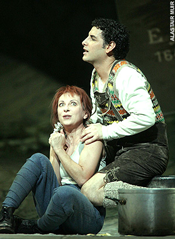The Met management opposed the idea (what next? setting operas in
contemporary costumes?), but Pons was a diva of the old school, impossible to
discipline or embarrass — she knew the wartime audience would roar and that
Met General Manager Edward Johnson wouldn’t dare reprimand her. As for the
opera — if a diva is cute and funny and has the high notes (Pons, we hear,
scored on all three counts — so, in my own experience, did Sutherland and,
at least in early years, Sills), then nothing can go wrong: Donizetti’s
vehicle is a ’54 Chevy, handsome, unpretentious and unbreakable. Fill ’er
up with high octane and she’ll take you where you want to go.
Too, since Pavarotti revealed the opera as a tenor vehicle as well, the
boys get to share the limelight, and for the last few years (at least since
Hermione Gingold began to camp it up — recent entrants include Montserrat
Caballé at Covent Garden), the two-line speaking role of the Duchess of
Krakenthorp has expanded like an accordion to become a major player. At the
Met these days, Marion Seldes gets two scenes and two outfits, as many
costumes as the prima donna.
Having heard last Saturday’s broadcast (full of audience giggle), I went
to the Met’s new production of La Fille (shared with Covent Garden
and Vienna) expecting to lean back and enjoy myself, and I did. So, as far as
I could tell, did everyone else in the packed house. First of all, there’s
the irresistible Donizetti fable, full of sentimental regret (during the
reign of pacific Louis-Philippe) for the days of Napoleonic gloire,
with march-time send-ups and regimental ditties (what does “rat-a-plan”
mean? It’s not in my Larousse), as well as sentimental
numbers that almost play themselves — the duet where Tonio and Marie
“prove” their love to each other’s exacting specifications, the
delicious trio of old comrades, “Tous les trois réunis” — all
of it melodious, hilarious, touching by turns, a musical with good singing
and no agonized American idols. La Fille couples lack of pretension
with Donizetti’s deft, professional hand at achieving exactly what he wants
to achieve: the characters do not surprise us — they’re much too
straightforward for that — but they’re worthy of the happiness they want,
and our hearts are warm when they get it.
Laurent Pelly’s production has a backdrop concocted by Chantal Thomas
from nineteenth-century European maps that form a mountainous Tyrolean
landscape on which Juan Diego Florez (who grew up in the even steeper Andes,
right?) takes an occasional pratfall while otherwise twirling like a
curly-headed Fred Astaire in lederhosen. If the guy, lately married in the
cathedral of Lima, loves his new bride half as much as he loves cutting up
for 4000 strangers she’s a lucky woman.
Natalie Dessay is charming when singing showpiece roulades while ironing
longjohns, when advancing on the enemy while seated on the floor in a
doll-like position, when striding about the stage with robotic gestures —
the same gestures and movements that tickled us when she played Olympia in
Hoffman and Zerbinetta in Ariadne. But the constant
mugging, intentionally or not, distract from imperfect fioritura and
breathless concluding notes, indeed from vocalism — you have to force
yourself to pay attention to the singing to notice it is being done at all. I
could have done without a great deal of the frenetic business — she never
calmed down long enough to let us enjoy the beautiful music she and Donizetti
might have made together. Charm is undercut by this level of aggression, and
it is possible to charm, even in knockabout farce, without channeling Lucy
Ricardo. Nor is it necessary to make invidious comparisons to the equally
funny but musically richer performances of Sutherland or Sills (or Freni, who
sang the loveliest, purest “Il faut partir” I’ve ever heard). Merely
cast an eye on Florez for balance: yes, he gallivanted adorably, yes he sang
eighteen high C’s — pure, even, perfectly produced high C’s at that —
in order to provide an encore, and stepped out of character to bow when they
were done — but when it was his turn to be Tonio, the naïve and ardent
lover, and to be quietly sincere, then quiet sincerity is what he gave us. He
knows when to turn off the spigot of farce and still be present. Dessay does
not seem to know how to do this, and her constantly jokey performance in due
course tired me out. Perhaps if she’d put a little of that gag energy into
maintaining a bel canto line, we’d have real opera here.
When Florez first set foot on the Met stage a few years back, his rapture
at having an audience to delight was like an electric shock passing visibly
through his body and outwards to tingle everyone present, but though his
Rossini technique was surely the most extraordinary of any tenor in a hundred
years, the voice itself (as he admits) was gruff, unbeautiful, lacking
sensuality. The instrument has lately grown larger and more lyrical, more
capable of sustaining beautiful sound, with no noticeable decline in
flexibility and an ease at filling an enormous theater that can only thrill.
Too, he knows how to act like an oaf so as to win any and every heart. A
perfect performance.
Felicity Palmer makes an elegant eldritch marquise (though why her German
schloss of Berkenfeld has added a letter to become the English
Berkenfield is a puzzle) and Alessandro Corbelli a stout, bald Sergeant
Sulpice. After a scrappy slog through the overture, Marco Armiliato shaped up
in the pit, and gave every sign of enjoying himself. Mention should be made
of choreographer Agathe Mélinand, whose four housemaids polishing furniture
while doing ballet exercises had us all in stitches, and who — I presume it
was her idea — had the soldiers keep waltz-time with their helmeted heads
to Florez’s encore.
John Yohalem
